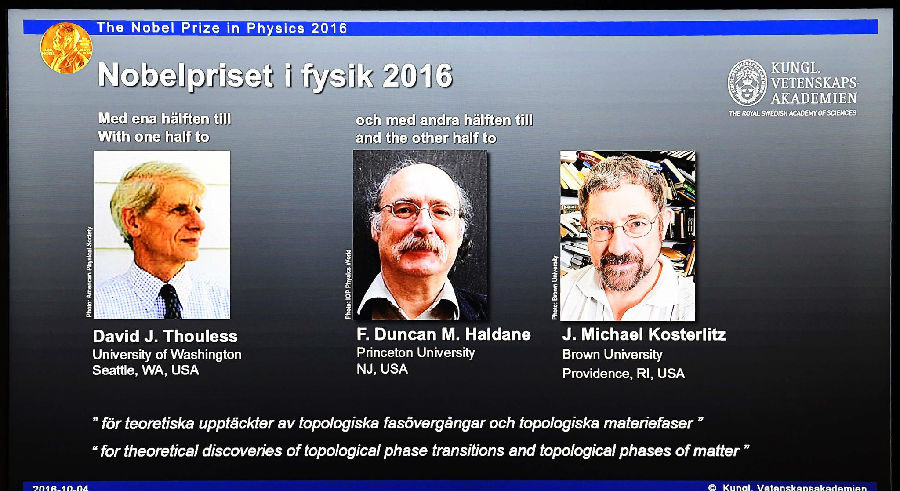(单词翻译:单击)
听力文本
This is Scientific American — 60-Second Science. I'm Steve Mirsky.
Got a minute?
"The Royal Swedish Academy of Sciences has decided to award the 2016 Nobel Prize in Physics with one half to David J. Thouless and the other half to F. Duncan Haldane and J. Michael Kosterlitz for theoretical discoveries of topological phase transitions and topological phases of matter."
Göran Hansson, secretary general of the academy, this morning. All three new Laureates were born in the U.K. and went on to U.S. institutions. Thouless is emeritus professor at the University of Washington. Haldane is at Princeton. And Kosterlitz is at Brown University.
"Professor Nils Mårtensson, the acting chairman of the Nobel Committee, will provide some introductory remarks on the Nobel Prize in Physics:"
"This year's Nobel Prize recognizes important discoveries in the field of condensed matter physics. And today's advanced technology, take for instance our computers, rely on our ability to understand and control the properties of the materials involved. And this year's Nobel Laureates have in their theoretical work discovered a set of totally unexpected regularities in the behavior of matter, which can be described in terms of an established mathematical concept, namely that of topology. This has paved the way for designing new materials with novel properties. And there is great hope that this will be important for many future technologies."

Following the announcement, Haldane joined in by phone to talk about the discovery.
"And at the time I felt it was of scientific interest and mathematical interest and very fascinating, as a consequence of quantum mechanics that we hadn't guessed at. But I didn't think it would ever find a practical realization. But if something is actually possible it'll eventually, with material science, any kind of unexpected possibilities will lead to some concrete realization."
"And these materials would have a possibility that information, either electronic or in other versions, could travel in one way around the edge of the system without the possibility of the information in the signal being disrupted by impurities or bends in the path. And so this aspect of things at least has a theoretical possibility of having great practical implications in subjects like the dream of building quantum computers. So it's taught us that quantum mechanics can behave far more strangely than we would have guessed. And we really haven't understood all the possibilities yet."
Thanks for the minute for Scientific American — 60-Second Science Science. I'm Steve Mirsky.
参考译文
这里是科学美国人——60秒科学。我是史蒂夫·米尔斯基。
有一分钟时间吗?
瑞典皇家科学院决定将2016年度诺贝尔物理学奖授予大卫·索利斯(占一半奖金)以及邓肯·霍尔丹和迈克尔·科斯特利茨(分享另一半),他们因在物质拓扑相变和拓扑相的重大理论发现而获奖。
皇家学会秘书长约兰·汉松今天上午宣布了这一消息。这三位新晋获奖者都在英国出生并在美国高校工作。索利斯是华盛顿大学的名誉教授。霍尔丹在普林斯顿大学任教。而科斯特利茨在布朗大学任教。
“诺贝尔委员会代理主席尼尔斯·莫滕松教授将致诺贝尔物理学奖颁奖词。”
“今年的诺贝尔物理学奖表彰的是凝聚态物理学领域的重要发现。今天的前沿技术,以电脑为例,依赖于我们理解和控制所用材料性能的能力。而今年的诺奖获得者在他们的理论工作中发现了一组在物质特性上完全意想不到的规律,这个规律可以用一个数学概念‘拓扑'来解释。这项工作为设计具备新特性的新材料铺平了道路。该理论突破有望在未来科技发展中发挥巨大作用。”
致辞结束后,大会接通了霍尔丹的电话,他对于这项发现谈了自己的看法。
“当时我只是觉得这项发现在科学和数学上都很有意义而且非常迷人,我们从来没有想过它会成为一项量子力学成果。但我不认为它能够得以应用。但如果真的可能,最终,材料学和任何意想不到的可能性将导致一些具体的实现成果。”
“通过这些材料,信息、电或其他形式,可以环绕系统边缘运动,且不会由于干扰和路径弯曲而丢失。因此在这一方面至少有一个理论上的可能性,在诸如构建量子计算机的梦想等方面有巨大的实践意义。所以,这教导我们量子力学远比我们预测地要表现的更神奇。我们还真的没有了解其全部的可能性。”
谢谢大家收听科学美国人——60秒科学。我是史蒂夫·米尔斯基。
译文为可可英语翻译,未经授权请勿转载!
重点讲解
重点讲解:
1. rely on 依赖;依靠;
例句:But she can use and rely on other strengths.
但她可以借用、依赖其他的力量。
2. in terms of 在…方面;从…角度看;根据…来说;
例句:She judges everyone in terms of her own standards.
她按照自己的标准来评判每一个人。
3. pave the way for 为…铺平道路;
例句:The agreement paves the way for lasting peace.
该协议为维持和平铺平了道路。
4. lead to 招致;致使;导致;
例句:The infection may lead to respiratory problems.
感染可能会引起呼吸道问题。


